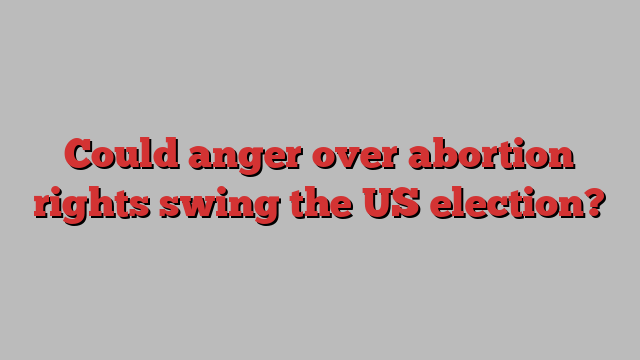
Whitney Fox is a political newcomer, but the Democratic candidate for Florida’s 13th congressional district is optimistic that anger over the rollback of abortion rights will nudge her to victory.
Fox is challenging Republican incumbent Anna Paulina Luna, a firebrand ally of Donald Trump and a self-described “pro-life extremist”, with a promise to defend women’s autonomy.
In a campaign video, Fox makes her pitch: “Our way of life is under attack by extremist politicians, attacking our reproductive freedoms, our democracy and doing nothing to lower the costs we are all struggling with,” she adds. “That’s why I am running for Congress: to end these attacks and protect our way of life, for my family and yours.”
But Fox faces an uphill battle if she is going to win on November 5. Pinellas county, where she is standing, has leaned conservative in recent years, and the non-partisan Cook Political Report rates the Fox-Luna race as “competitive” but “likely Republican”.
Over a lunch of Cuban sandwiches in the city of St Petersburg, Fox is confident. Luna is wrong on this issue, she says, “And we know that with the right candidate, the right message, and our well-run campaign, we will be able to beat her.”
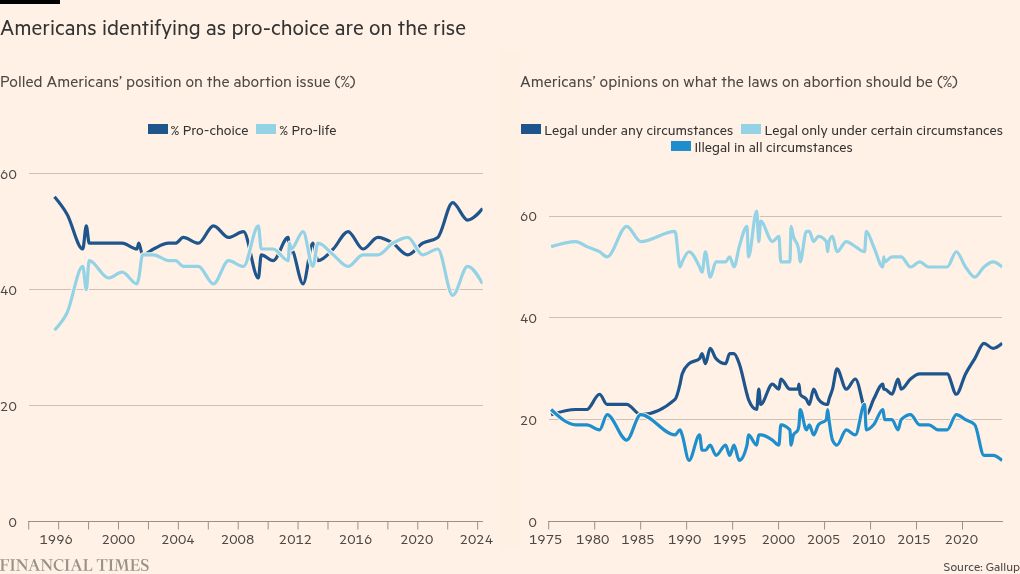
Democrats across the country are making the same bet. With just under two weeks until election day, when Americans will choose not only a new president but also a new Congress, they believe the hardline positions on abortion being pushed by many Republicans will work in their favour.
Florida is one of nearly a dozen states where voters will be given a direct say on abortion laws through ballot referendums in November, including presidential battlegrounds such as Arizona and Nevada that are likely to determine who wins the White House.
Ever since the US Supreme Court overturned Roe vs Wade in 2022, striking down the national right to an abortion, Republican officials have been pushing for increasingly prohibitive abortion restrictions at the state level. More than 20 states have laws to limit abortion earlier in pregnancy than the viability standard set by Roe, including 13 states where abortion is now banned in almost all circumstances, including for victims of rape and incest.
Some conservative lawmakers and judges are going further, calling for restrictions on access to contraception and fertility treatments, including in vitro fertilisation.
All of this is at odds with the clear majority of Americans who identify as pro-choice, according to multiple polls. Opposition to the hardline policies was credited with supercharging Democratic victories in the 2022 midterms and several other special elections and off-year contests since.
Democrats are now bullish that voter discontent with Republicans on the issue will once again motivate voters — especially women and young people — to turn out in large numbers for their candidates, from vice-president Kamala Harris to congressional hopefuls like Fox.
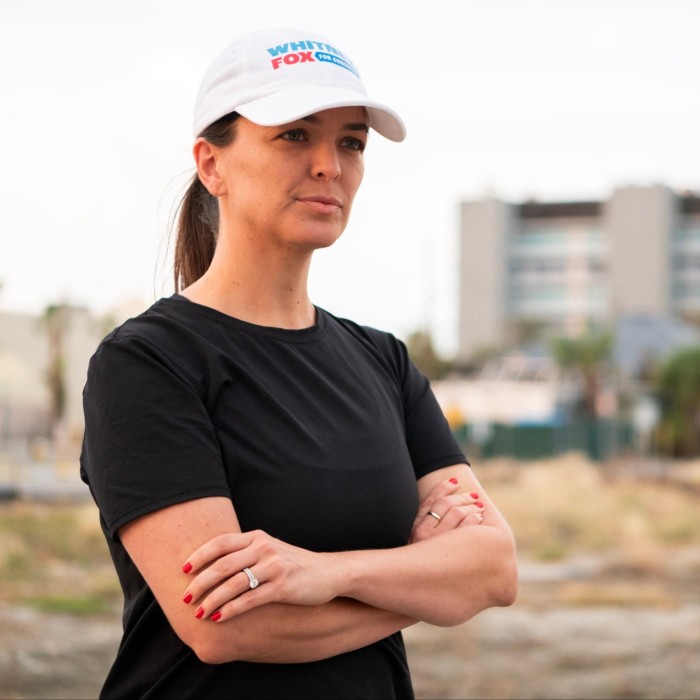

At the same time, many high-profile Republicans — including Trump — have scrambled to distance themselves from the religious right, to avoid alienating moderate and swing voters whose support will be critical in an election that is on a knife-edge.
The latest polling suggests while Harris and Trump are in effect tied in the crucial swing states, the former president has a problem with female voters in particular: a recent NBC News survey showed women across the country supporting his rival by a 14-point margin.
At a campaign stop in the battleground state of Pennsylvania on Monday, Liz Cheney, the former Republican congresswoman who broke with her party over Trump and is now campaigning for Harris, called on women of all political stripes to “reject cruelty” and “misogyny” at the ballot box.
“[Abortion] is not an issue that we’re seeing break down across party lines,” Cheney added. “There are many of us around the country who have been pro-life but who have watched . . . state legislatures put in place laws that are resulting in women not getting the care they need.”
Jessica Mackler, president of Emily’s List, a national group that works to elect Democratic women who support abortion rights, says the issue is already shaping how Americans will vote.
“The question is not: Will abortion drive votes in this election?” she says. “It is: How far, how wide and how deep does that impact go?”
Florida — a racially and economically diverse state that is America’s third-largest by population — was for decades considered a bellwether of who would take the White House. Pinellas county, where Fox and Luna are competing, has picked the winner of every presidential election since 1980, with the exception of George W Bush in 2000.
But the state, which Trump adopted as his own after making Mar-a-Lago his primary residence in 2019, has become increasingly Republican. Trump won Florida by 3.4 points in 2020 and, in the 2022 midterms, Republican governor Ron DeSantis was re-elected by a nearly 20-point margin.
“Trump has carried Florida twice. I don’t know why he won’t carry it a third time,” says Brad Coker, a veteran non-partisan pollster and chief executive of Mason-Dixon Polling in Jacksonville, Florida’s biggest city.
For now, Florida is leaning Republican, the Financial Times poll tracker shows, with Trump holding a 5.9-point lead over Harris. Yet there are signs of brewing discontent; political analysts expect the results in November will be much closer than they were in 2022. Other polls show Florida’s US Senate race — with incumbent Republican Rick Scott facing Democratic challenger Debbie Mucarsel-Powell — within striking distance for Democrats.
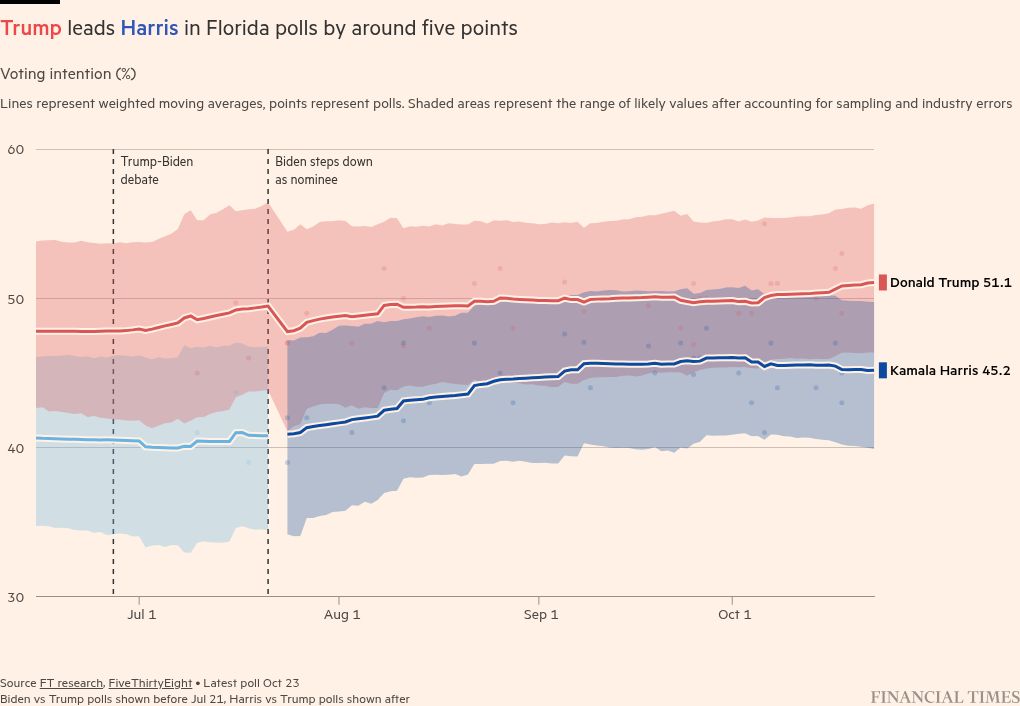
DeSantis’s approval rating has also fallen sharply in the past two years, a trend some analysts attribute to his increasingly conservative policy positions. In May, he signed a law banning access to abortion in the state after the sixth week of pregnancy — when many women do not yet realise they are pregnant — with some exceptions for victims of rape or incest, or to save the life of the mother.
In this election, voters have a chance to overturn that law thanks to a ballot question known as Amendment 4, a referendum on enshrining abortion rights in Florida’s constitution. If 60 per cent of the electorate votes yes, the amendment would broadly guarantee access to abortion until a foetus can survive outside the womb, usually defined as around 24 weeks of pregnancy.
The referendum, which was added to the ballot following a petition campaign by pro-choice groups, is nevertheless seen as an opening for Democrats, who are confident it will draw out voters on their side even though the campaign is not technically affiliated with any political party.
“In every district that we are in, in every state that we are in, this is the issue that is driving the Democratic coalition in a really remarkable way,” says Mackler of Emily’s List. “Where abortion is on the ballot in any form, it is a driver of wins for Democrats.”
There is growing evidence that ballot measures to codify abortion rights can pass even in states that skew conservative, especially when only a simple majority is required.
The most recent example was last year in Ohio, where an amendment enshrining reproductive rights in the state’s constitution passed with nearly 57 per cent of the vote. A year earlier, a similar measure passed in Kansas with 59 per cent support.
Both those states are reliably Republican: the Financial Times poll tracker shows Trump on course to win Ohio by more than 8 points and Kansas by 16. That has prompted GOP leaders to shrug off suggestions that support for abortion rights will fuel a so-called “blue wave” next month, insisting that issues like the economy carry more weight with voters.
A recent nationwide Pew poll found the economy was the number-one issue for all voters in the election, while abortion ranked eighth. However, for those who identify as Harris supporters, abortion ranked as the third most important issue.
“You hear a lot of noise in the media, but the reality on the ground is that we are in a better place than we ever have been in Florida,” says Evan Power, chair of the state’s Republican party. “If you talk to Floridians, they care about immigration, inflation and the economy.”
Republicans already have an advantage over the Democrats when it comes to registered voters in the state, according to the latest official figures. Roughly 5.4mn people in Florida are registered Republicans, compared to 4.4mn registered Democrats. Another 3.5mn are registered to vote but unaffiliated with either major party.
That makes non-partisan experts like Coker doubtful Democrats can pull off an upset. “[Abortion] might move the needle a little in Florida when you start talking about the margins, but I don’t think it is going to change the overall outcome,” he says. “It is not going to be enough to flip a state like Florida.”
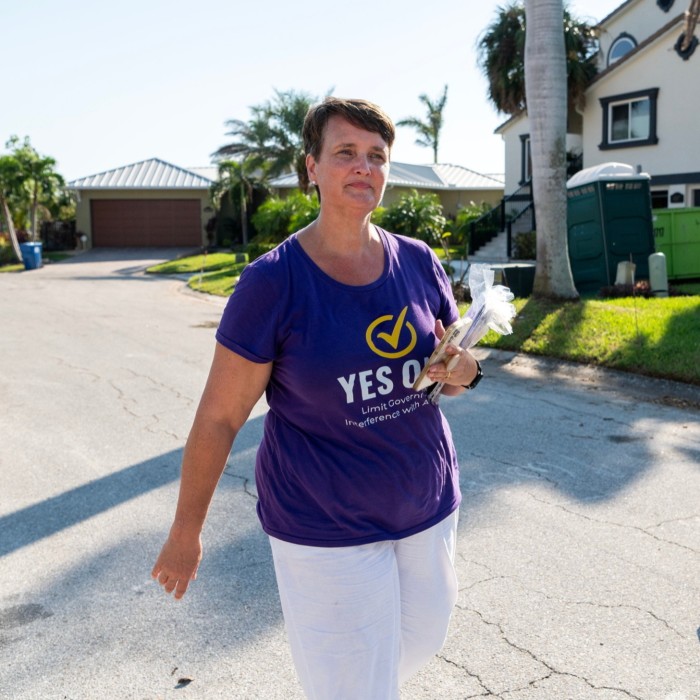
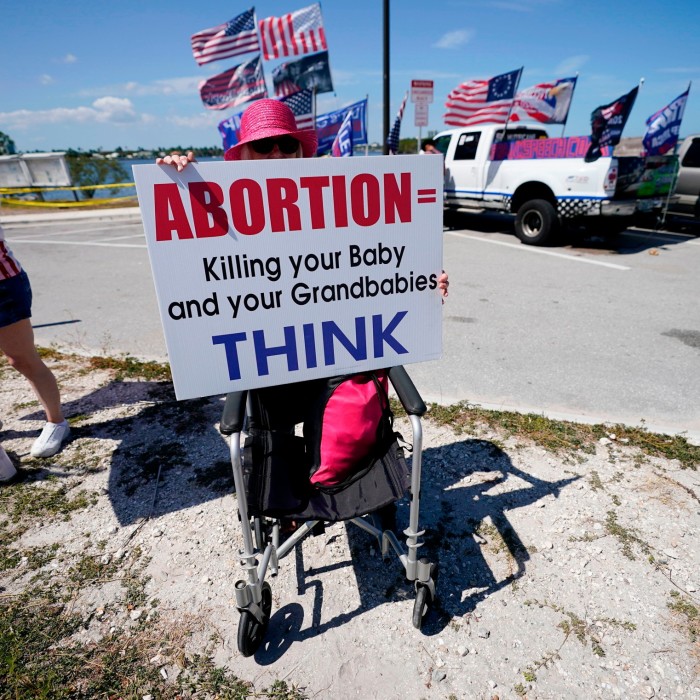
With election day nearing, abortion has nevertheless proven a thorny subject for Florida’s most famous Republican: Trump.
The former president has shifted his stance on the issue several times, starting in the 1990s when the then real estate magnate described himself as “very pro-choice.” A decade later, as he began toying with politics, he began identifying as pro-life.
As a presidential candidate in 2016, Trump said women seeking abortions should be subject to “some sort of punishment”, and vowed to nominate Supreme Court justices committed to overturning Roe. In 2022, his three appointees, Neil Gorsuch, Brett Kavanaugh and Amy Coney Barrett, did just that. Trump called the outcome the “biggest win for life in a generation”.
Since then, the Republican candidate has tried to appear more moderate, declining, for example, to endorse calls from the right for a national abortion ban.
This has led to stumbles, including in August when he told an interviewer that Florida’s six-week abortion ban was “too short”, to the fury of his conservative base, some of whom threatened they would no longer knock on doors on his behalf. Trump then rowed back and said he would be voting “no” on Amendment 4.
Power, Florida’s Republican chair, says Trump “got to the place where he needed to be”. But Carlos Curbelo, a former Republican congressman from south Florida, says Trump’s messaging has been “sloppy and undisciplined”. “He has managed to lose credibility on both sides of the issue,” Curbelo adds.
Trump’s stance was further muddled this month, when his wife, Melania, announced her support for abortion rights in a new memoir, writing: “A woman’s fundamental right of individual liberty, to her own life, grants her the authority to terminate her pregnancy if she wishes.”
Power played down the intervention, saying the Republican party is a “big tent”. “People are allowed to have their own opinions,” he adds.
Others say it is obvious Trump is playing both sides. “Does anyone not see through it?” asks Amy Weintraub, reproductive rights programme director at Progress Florida, one of the organisations that worked to get Amendment 4 on the ballot. “He is just doing what he needs to politically.”
At a Tampa strip mall on a recent Saturday morning, support for Trump is on display at an event where Scott, the Republican senator seeking re-election, is due to speak.
Scott too is walking a political tightrope, saying he intends to vote against Amendment 4 — even as he suggests Florida might be better off with more permissive abortion laws.
“If you look at our state right now, I think most people would say 15 weeks with the exceptions,” Scott tells the FT, suggesting abortion access should be limited to roughly the first trimester of pregnancy. “But I think the way it ought to happen is to have statewide referendums and figure out what exactly people believe.”
Voters at the event express a range of views on abortion — but remain united in their commitment to Trump, Scott and other Republicans.
Praising DeSantis for “stepping up”, one woman in her 50s, who declined to give her name, says she is “against abortion . . . based on my faith and when I believe life begins.”
Although she is sceptical Trump shares her Christian values, she says she will be voting for him regardless. “I have to go with what I truly believe we need as a country and . . . I don’t feel like the other way is any better.”
Another pro-lifer, Marie Stefanovic, 81, wearing a “Patriots for Trump” T-shirt, says she will be voting against Amendment 4. She says Trump’s views on abortion have no bearing on her support for him. “I don’t have to go with everything he does. I have my own voice,” she adds.
Her 49-year-old son, Lou — also a committed Trump voter — says he is undecided on Amendment 4. “In a perfect world, we could all be pro-life, but it is not a perfect world,” he says. “Perhaps a more liberal approach to that issue might be better for society.”
Cassandra, 72, a long-standing Republican who declined to give her surname, nods in agreement, saying her party needs to moderate if it wants to win at the ballot box. “We would never win elections if we were adamant with strict rules,” she says. “You have to give and take a bit.”
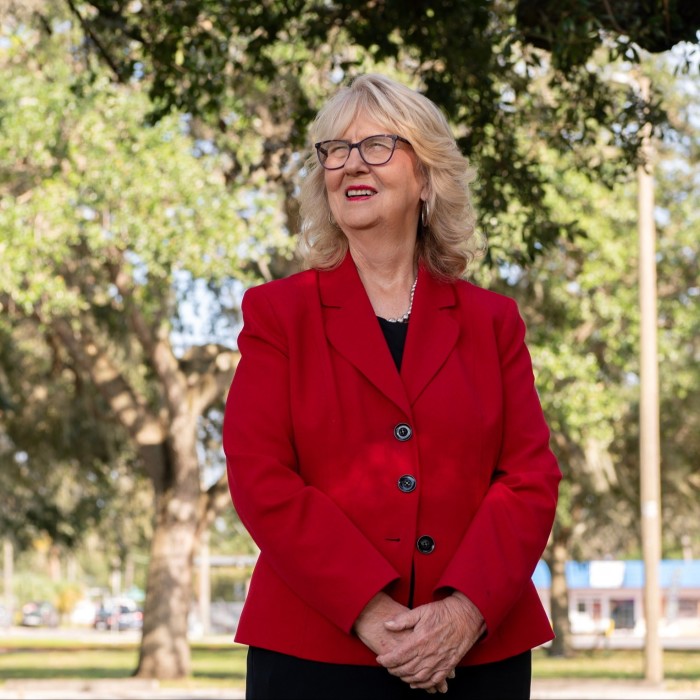
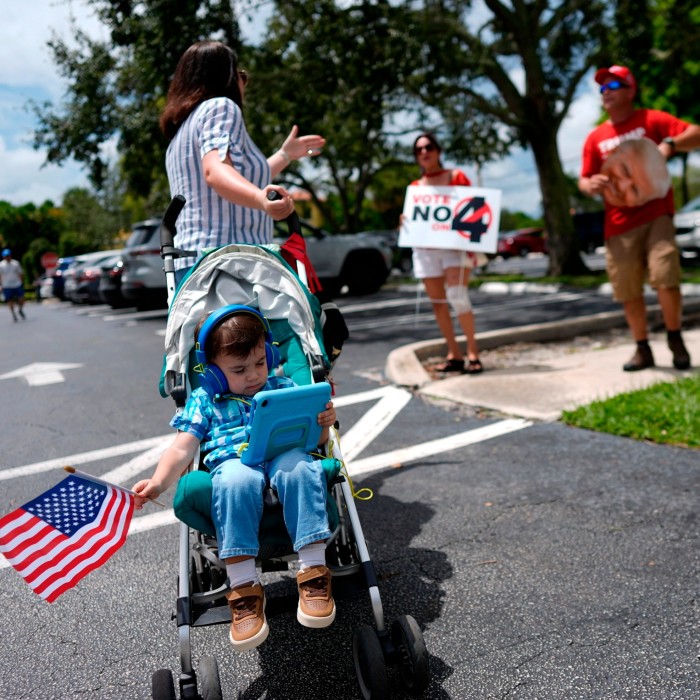
Political analysts in Florida expect a small but significant share of voters will take a similar approach: backing Trump and supporting more relaxed abortion laws.
“[Republican voters] are not going to turn their backs on their party,” says Susan MacManus, professor emerita at the University of South Florida. “But on an issue with no party label after it, they are voting on their feelings and values.”
But for many people, abortion and party politics are inextricable. A few hours after the Scott event in Tampa, pro-choice canvassers fan out across nearby St Petersburg to encourage people to vote “yes” on Amendment 4.
Even though volunteers make no mention of political parties, several voters are clear that they are voting for the Democrats.
“I am voting for Democrats all the way,” says one man from his doorstep. “This is probably the most important election in our lifetimes.”
Another man tending his garden reveals his wife and daughter have already mailed in their ballots and jokes that they are voting for Trump.
When the canvasser says she is not there to talk about the top of the ticket, the man jumps in: “It’s the same thing, isn’t it? Come on . . . if he gets into office again, he is going to try to do everything to knock [abortion rights] down.”